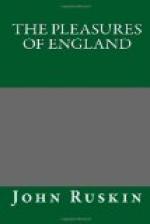Next, the Norman is scarcely more apprehensive than the Celt, but he is more constructive, and uses to good advantage what he learns from the Frank. His main characteristic is an energy, which never exhausts itself in vain anger, desire, or sorrow, but abides and rules, like a living rock:—where he wanders, he flows like lava, and congeals like granite.
Next, I take in this first sketch the Saxon and Frank together, both pre-eminently apprehensive, both docile exceedingly, imaginative in the highest, but in life active more than pensive, eager in desire, swift of invention, keenly sensitive to animal beauty, but with difficulty rational, and rarely, for the future, wise. Under the conclusive name of Ostrogoth, you may class whatever tribes are native to Central Germany, and develope themselves, as time goes on, into that power of the German Caesars which still asserts itself as an empire against the licence and insolence of modern republicanism,—of which races, though this general name, no description can be given in rapid terms.
And lastly, the Lombards, who, at the time we have to deal with, were sternly indocile, gloomily imaginative,—of almost Norman energy, and differing from all the other western nations chiefly in this notable particular, that while the Celt is capable of bright wit and happy play, and the Norman, Saxon, and Frank all alike delight in caricature, the Lombards, like the Arabians, never jest.
These, briefly, are the six barbaric nations who are to be taught: and of whose native arts and faculties, before they receive any tutorship from the south, I find no well-sifted account in any history:—but thus much of them, collecting your own thoughts and knowledge, you may easily discern—they were all, with the exception of the Scots, practical workers and builders in wood; and those of them who had coasts, first rate sea-boat builders, with fine mathematical instincts and practice in that kind far developed, necessarily good sail-weaving, and sound fur-stitching, with stout iron-work of nail and rivet; rich copper and some silver work in decoration—the Celts developing peculiar gifts in linear design, but wholly incapable of drawing animals or figures;—the Saxons and Franks having enough capacity in that kind, but no thought of attempting it; the Normans and Lombards still farther remote from any such skill. More and more, it seems to me wonderful that under your British block-temple, grimly extant on its pastoral plain, or beside the first crosses engraved on the rock at Whithorn—you English and Scots do not oftener consider what you might or could have come to, left to yourselves.




